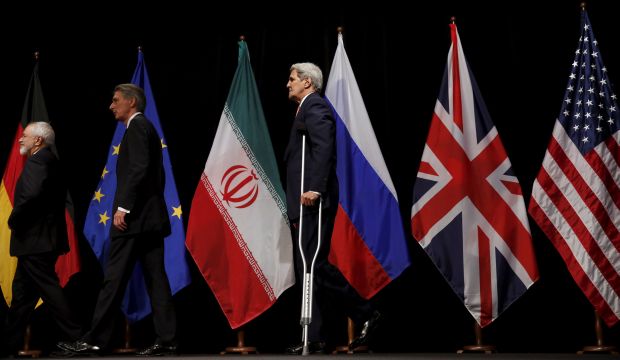
US Secretary of State John Kerry, British Foreign Secretary Philip Hammond (C) and Iranian Foreign Minister Mohammad Javad Zarif (L) leave the stage after a group picture at the Vienna International Center in Vienna, Austria on July 14, 2015. (REUTERS/Carlos Barria)
Under the deal, sanctions imposed by the United States, European Union and United Nations would be lifted in return for Iran agreeing long-term curbs on a nuclear program that the West has suspected was aimed at creating a nuclear bomb.
Reaching a deal is a major policy victory for both US President Barack Obama and Iran’s President Hassan Rouhani, a pragmatist elected two years ago on a vow to reduce the diplomatic isolation of a country of 77 million people.
But both leaders face scepticism from powerful hardliners at home after decades of enmity between nations that referred to each other as “the Great Satan” and a member of the “axis of evil”.
While the main negotiations were between the US and Iran, the four other UN Security Council permanent members Britain, China, France and Russia are also parties to the deal, as is Germany.
“All the hard work has paid off and we sealed a deal. God bless our people,” an Iranian diplomat told Reuters on condition of anonymity ahead of the official announcement.
Israeli Prime Minister Benjamin Netanyahu called the deal “a bad mistake of historic proportions”.
“Iran will get a jackpot, a cash bonanza of hundreds of billions of dollars, which will enable it to continue to pursue its aggression and terror in the region and in the world,” he said. “Iran is going to receive a sure path to nuclear weapons.”
Israeli Deputy Foreign Minister Tzipi Hotovely called the deal an “historic surrender”. She said on Twitter that Israel would “act with all means to try and stop the agreement being ratified”, a clear threat to try to use its influence to block it in the Republican-controlled US Congress.
Congress has 60 days to review the deal, and if it votes to disapprove of it, Obama can veto the rejection. It would require two thirds of lawmakers to override such a veto, which means some of Obama’s fellow Democrats would have to rebel against one of the signature achievements of their president in order to kill the deal.
Final talks in Vienna involved nearly three weeks of talks between US Secretary of State John Kerry and Iran’s Foreign Minister Mohammad Javad Zarif, unprecedented between countries that have been enemies since Iranian revolutionaries stormed the US embassy in Tehran in 1979 and took 52 Americans hostage.
For Obama, the diplomacy with Iran, begun in secret more than two years ago, ranks alongside his normalization of ties with Cuba as landmarks in a legacy of reaching out to enemies that tormented his predecessors for decades.
Iran’s hatred of the US, a defining trait of its ruling system, was on display only last week, when it marked the end of the Ramadan fasting month with an annual day of protests, with crowds chanting “Death to Israel” and “Death to America”.
Iran’s IRNA news agency said billions of dollars in frozen funds would be released under the deal, and sanctions on its central bank, national oil company, shipping and airlines would be lifted. It will retain the right to enrich some uranium, at an amount Western countries say keeps it from stockpiling enough to make a nuclear weapon, which it has always denied is its aim.
